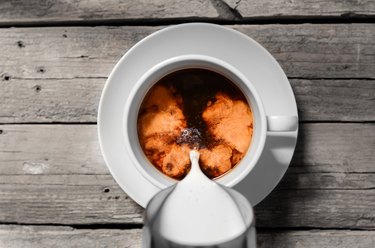
You may drink caffeinated beverages, such as coffee or tea, in the morning because they offer a boost of energy. Because caffeine is a stimulant, you could find yourself lightheaded after drinking coffee — particularly if you drink more than you're used to.
When you consume caffeinated foods or drinks, it passes quickly to the brain and stimulates the central nervous system, relieving fatigue or drowsiness, especially upon waking. But, you can get too much of a good thing.
Video of the Day
Video of the Day
Know the Effects
As a central nervous stimulant, caffeine has a variety of effects that can be associated with lightheadedness. Caffeine can increase your heart rate, and depending on your cardiovascular health, this could produce a sensation of lightheadedness or dizziness.
In addition, caffeine has a diuretic effect, meaning is helps rid the body of excess fluids. In some cases, especially if you do not replace fluids by drinking enough water, this may lead to dehydration and lightheadedness.
Dizzy After Coffee
According to Mayo Clinic, up to 400 milligrams per day of caffeine appears to be safe for most adults. Approximately two or three 8-ounce coffee drinks, or three or four cups of tea a day. Don't forget to check the caffeine content in sodas and energy drinks so you stay within the 400-milligram maximum.
In most cases these guidelines will help you limit lightheadedness and other possible negative side effects that may result from heavy caffeine consumption. According to Michigan State University, side effects of overconsumption of caffeine can include diarrhea, headache, excitement, heart palpitations, insomnia, elevated heart rate, anxiety, tremor, nervousness, muscle tension, ringing in the ears and increased stomach acid production.
Beware Caffeine Addiction and Withdrawal
Caffeine is an addictive substance, and you may develop a dependence if you consume coffee or caffeinated beverages regularly, according to Cleveland Clinic. If you decide to cut back on your caffeine intake or cut out caffeine, you may experience side effects such as restlessness, headaches and anxiety. Many of these withdrawal symptoms, especially anxiety, can trigger sensations of lightheadedness.
To reduce your chances of withdrawal symptoms, Cleveland Clinic suggests that you cut back gradually. Swap out cold caffeinated drinks for water. Alternate between regular and decaf coffee, slowly replacing more of your regular coffees with decaf, over a period of two to three weeks. Cleveland Clinic also cautions that while you might be tempted to take medication for withdrawal headaches, many of these products also contain caffeine.
Consume with Caution
To avoid unpleasant side effects produced by caffeine, carefully control your intake of caffeinated substances. If you enjoy coffee or tea in the morning, consider alternating between caffeinated and decaffeinated drinks. Drink plenty of water to offset the diuretic effects of caffeinated drinks.
If you have been diagnosed with a specific health condition, consult with your doctor about your use of caffeine, especially if you are consuming large quantities or experiencing side effects, such as lightheadedness.